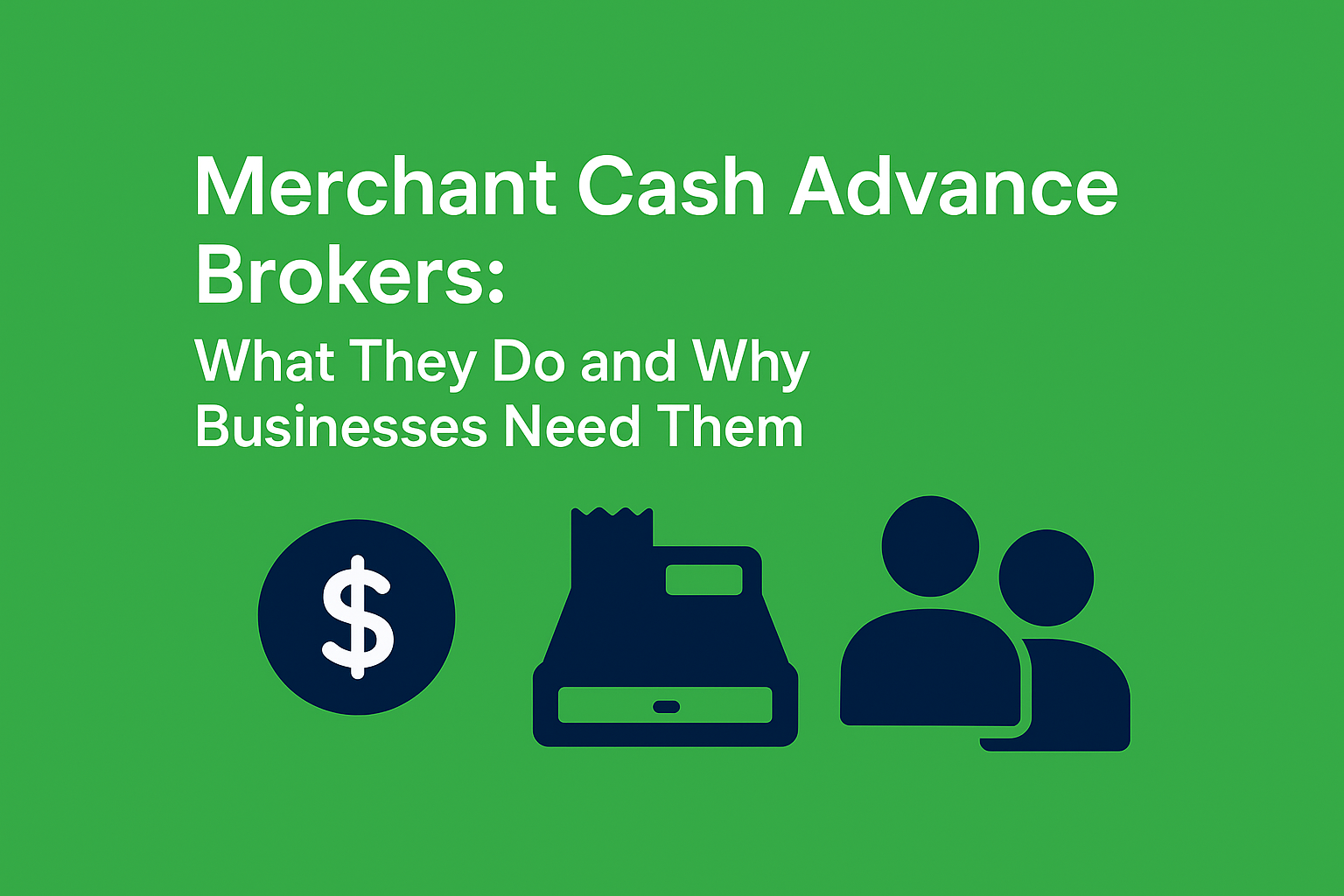Our goal at Lending Valley is to provide all small business owners access to the best loans possible for their business. You can rest assured we will get you the best rates in the market!

In today’s fast-paced business world, access to quick and flexible funding can make all the difference. Whether you’re running a retail store, restaurant, or service-based business, unexpected expenses or growth opportunities often demand immediate cash flow.
That’s where Merchant Cash Advance (MCA) brokers come in. They’re not traditional bankers, and they don’t offer standard loans. Instead, MCA brokers help connect small businesses with lenders who offer cash advances based on future sales — a lifeline for many entrepreneurs who can’t qualify for traditional bank loans. Let’s break down what these brokers do, how the process works, and why both small business owners and aspiring brokers should understand this growing financial niche.
A Merchant Cash Advance Broker acts as a middleman between business owners and lenders who provide merchant cash advances. Their primary job is to assess a business’s financial health and match it with the best available funding option. Instead of loaning money directly, these brokers help business owners secure cash advances from lenders in exchange for a percentage of their future credit and debit card sales. Here’s how the relationship typically works:
Before understanding the broker’s role in depth, it helps to know how a merchant cash advance itself operates. A merchant cash advance isn’t a traditional loan — it’s a lump sum of money provided upfront to a business in exchange for a portion of its future sales. Repayments are automatically deducted as a fixed percentage of daily or weekly revenue.
| Feature | Merchant Cash Advance | Traditional Bank Loan |
|---|---|---|
| Funding Speed | 24–72 hours | 2–6 weeks |
| Credit Requirements | Flexible | Strict |
| Repayment | % of daily sales | Fixed monthly payments |
| Collateral | Not required | Usually required |
| Approval Rate | High | Moderate to low |
In short, MCAs offer flexibility and speed — two things small businesses often need most.
MCA brokers simplify the entire process for both lenders and business owners. Instead of navigating dozens of applications or confusing requirements, a business can rely on the broker’s expertise to secure the right funding fast. Here’s what brokers typically handle:
Small business owners often wear many hats — marketer, accountant, manager, and sometimes, even their own funding agent. But handling financial negotiations without proper experience can lead to poor deals or rejected applications. That’s where MCA brokers prove invaluable. They bring:
It’s natural to wonder why you’d need a broker when you could approach lenders directly. The difference comes down to access, knowledge, and negotiation power.
| Comparison Point | Using an MCA Broker | Going Directly to a Lender |
|---|---|---|
| Access to Multiple Offers | Yes | Limited to one lender |
| Personalized Funding Match | Yes | No |
| Negotiation Support | Yes | No |
| Application Speed | Fast | Moderate |
| Fees | Transparent broker commission | Possible hidden costs |
| Brokers act as your funding advocate — they save time, protect your interests, and ensure the terms you get are actually beneficial for your business. |
It’s important for business owners and aspiring brokers alike to understand how commissions work. MCA brokers are typically paid by the lender, not the business owner. This payment structure ensures transparency and reduces financial pressure on clients. Here’s a quick breakdown:
The MCA industry is rapidly growing, and with more businesses needing fast cash flow, broker opportunities are expanding. To become an MCA broker, you don’t need a financial degree — but you do need communication skills, ethical standards, and persistence. Here’s how to get started:
Step 1: Learn the Industry
Understand the basics of MCAs, factor rates, and repayment models. Study lender types and funding structures.
Step 2: Choose a Reputable ISO Program
Independent Sales Organizations (ISOs) partner with lenders and allow brokers to operate under their network. Joining a strong ISO program gives you training, leads, and access to funding platforms.
Step 3: Build a Network
Connect with small business owners through online platforms, email campaigns, or cold calls. The more leads you generate, the more commissions you earn.
Step 4: Stay Transparent
Always disclose your fees and commissions. Honesty builds trust and repeat clients.
Read more: MCA Funding for California-Based Businesses – Eligibility & Process
Before jumping in, it’s important to know what separates top brokers from average ones. Transitioning from a beginner to a trusted MCA broker requires developing the right mix of sales, financial, and interpersonal skills. Key skills include:
Many people confuse MCA brokers with loan sharks or aggressive telemarketers — which couldn’t be further from the truth. Here are some myths worth clearing up:
Merchant cash advances gained massive traction post-pandemic as small businesses sought faster funding alternatives. With traditional bank loans still slow and rigid, MCAs offered a flexible path to financial stability. According to U.S. small business data, MCA funding volume has surpassed $20 billion annually, with thousands of brokers helping match clients and lenders. This growth trend shows no signs of slowing, thanks to:

Merchant cash advance brokers play a critical role in today’s business ecosystem. For small businesses, they offer quick access to cash without lengthy approval delays. For brokers, it’s a rewarding career with high earning potential and flexible work options. If you’re a business owner, partnering with a trusted MCA broker can help you unlock funds that fuel growth and stability. And if you’re an aspiring broker, this industry offers an opportunity to build a profitable career while helping small businesses thrive.
Looking for fast, reliable business funding? Connect with a verified Merchant Cash Advance Broker today and explore funding options tailored to your revenue and goals. Don’t let cash flow hold your business back — take the next step toward growth now.
An MCA broker connects small businesses seeking quick funding with lenders offering merchant cash advances. They assess a business’s needs, match them with the right funding provider, and help complete the application process. Essentially, they simplify access to fast capital while earning commissions from the lender.
Brokers earn commissions from lenders each time they successfully close a funding deal. The amount depends on the size of the advance and the agreed commission rate. Some top networks, like Lending Valley, offer higher payouts and recurring commission opportunities.
Many small business owners find loan applications confusing and time-consuming. MCA brokers save them time by handling the paperwork and connecting them with trusted, fast-approving lenders. This makes the process smoother and increases their chances of securing funding.
You don’t need a finance degree, but having strong communication and sales skills helps a lot. Understanding small business financing and lender terms can make you more effective. Training with reputable companies like Lending Valley can also fast-track your career.
Yes, if managed wisely and obtained from a transparent lender. MCAs provide quick cash without requiring perfect credit, but repayment terms can vary. That’s why it’s best to work through a trusted broker who ensures fair terms and helps avoid predatory offers.